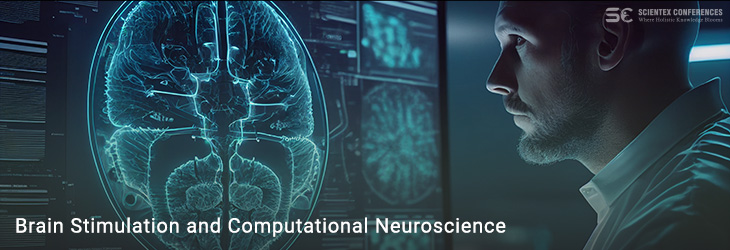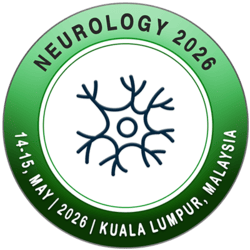Track: Brain Stimulation and Computational Neuroscience

Session Overview:
Explore the groundbreaking convergence of brain stimulation techniques and computational neuroscience in this dynamic session. We will delve into the latest advancements in brain stimulation methods, including non-invasive techniques like Transcranial Magnetic Stimulation (TMS) and Transcranial Direct Current Stimulation (tDCS), and their synergistic integration with computational neuroscience. Discover how cutting-edge computational models are being used to simulate and analyze brain function, improve understanding of neurological and psychiatric disorders, and enhance the precision of therapeutic interventions. This session will showcase innovative research, real-world applications, and case studies that highlight the transformative potential of combining these fields. Participants will gain insights into how these advancements are driving fundamental research and clinical progress, offering new avenues for diagnosis, treatment, and personalized care. Join us to engage with leading experts, explore interactive demonstrations, and contribute to the future of brain stimulation and computational neuroscience.
Recent Developments:
Recent advancements in brain stimulation and computational neuroscience have led to significant innovations. Focused ultrasound, a non-invasive technique using high-intensity sound waves, is showing promise in treating conditions like essential tremor and Parkinson's disease. Additionally, personalized stimulation protocols, tailored using real-time brain imaging, are improving treatments for depression and anxiety. In computational neuroscience, deep learning models are providing fresh insights into brain connectivity and disease mechanisms, enhancing predictive capabilities. Platforms such as the Human Connectome Project and the Blue Brain Project are creating intricate simulations of brain networks, furthering our understanding of brain functions and disorders. Integration of brain stimulation and computational models has yielded adaptive closed-loop systems, which adjust stimulation based on real-time neural feedback, and hybrid computational models that blend biophysical simulations with machine learning, paving the way for personalized medicine. Looking ahead, research into neurotechnology for cognitive enhancement and the development of ethical AI guidelines are poised to advance cognitive functions and ensure responsible application of these technologies.
Sub-tracks:
Transcranial Magnetic Stimulation (TMS)
Focuses on using magnetic fields to stimulate nerve cells in the brain, exploring its applications in treating depression, anxiety, and other neurological conditions.
Transcranial Direct Current Stimulation (tDCS)
Investigates the effects of applying low electrical currents to the scalp, enhancing cognitive functions and therapeutic outcomes in neurological and psychiatric disorders.
Deep Brain Stimulation (DBS)
Examines the use of implanted electrodes to deliver electrical impulses to specific brain regions, providing treatment insights for Parkinson’s disease and other movement disorders.
Neurofeedback
Explores the use of real-time brain activity monitoring to train individuals in self-regulation of brain function, aiming to improve mental health and cognitive performance.
Computational Brain Models
Focuses on creating detailed simulations of brain activity and disorders, aiding in understanding neural processes and predicting responses to treatments.
Machine Learning in Neuroscience
Investigates the application of machine learning algorithms to analyze neural data, improving diagnosis, prognosis, and treatment planning for neurological diseases.
Brain-Computer Interfaces (BCIs)
Examines technologies that enable direct communication between the brain and external devices, with applications in rehabilitation and enhancing cognitive or motor functions.
Closed-Loop Stimulation Systems
Focuses on integrating real-time brain activity monitoring with stimulation devices to create adaptive systems that personalize treatment based on ongoing neural feedback.
Neuroimaging and Brain Mapping
Investigates advanced imaging techniques for visualizing brain structure and function, enhancing our understanding of neural networks and abnormalities in various conditions.
Ethical and Social Implications
Addresses the ethical considerations and societal impacts of brain stimulation and computational neuroscience technologies, ensuring responsible research and application practices.
Scientific Highlights
- Neurology
- Neuro Anatomy
- Mental Health and Psychiatry
- Geriatric Neurological Disorders
- Neuromuscular Diseases
- Brain Tumor and Neuro-oncology
- Cerebrovascular and Critical Care Neurology
- Clinical Neurophysiology
- Central Nervous System
- Neuro-Ophthalmology
- Pediatric Neurology
- Neuroimaging and Brain Mapping
- Neurogenetics and Neurodegenerative Disease
- Behavioral and Cognitive Neuroscience
- Neurochemistry and Neuropharmacology
- Spinal Neurosurgery and Neural Transplantation
- Neuro Robotics and Neuro Modulators
- Addiction and Adult Psychology
- Brain Stimulation and Computational Neuroscience
- Neural Control of Micturition
- Parkinson's Disease


